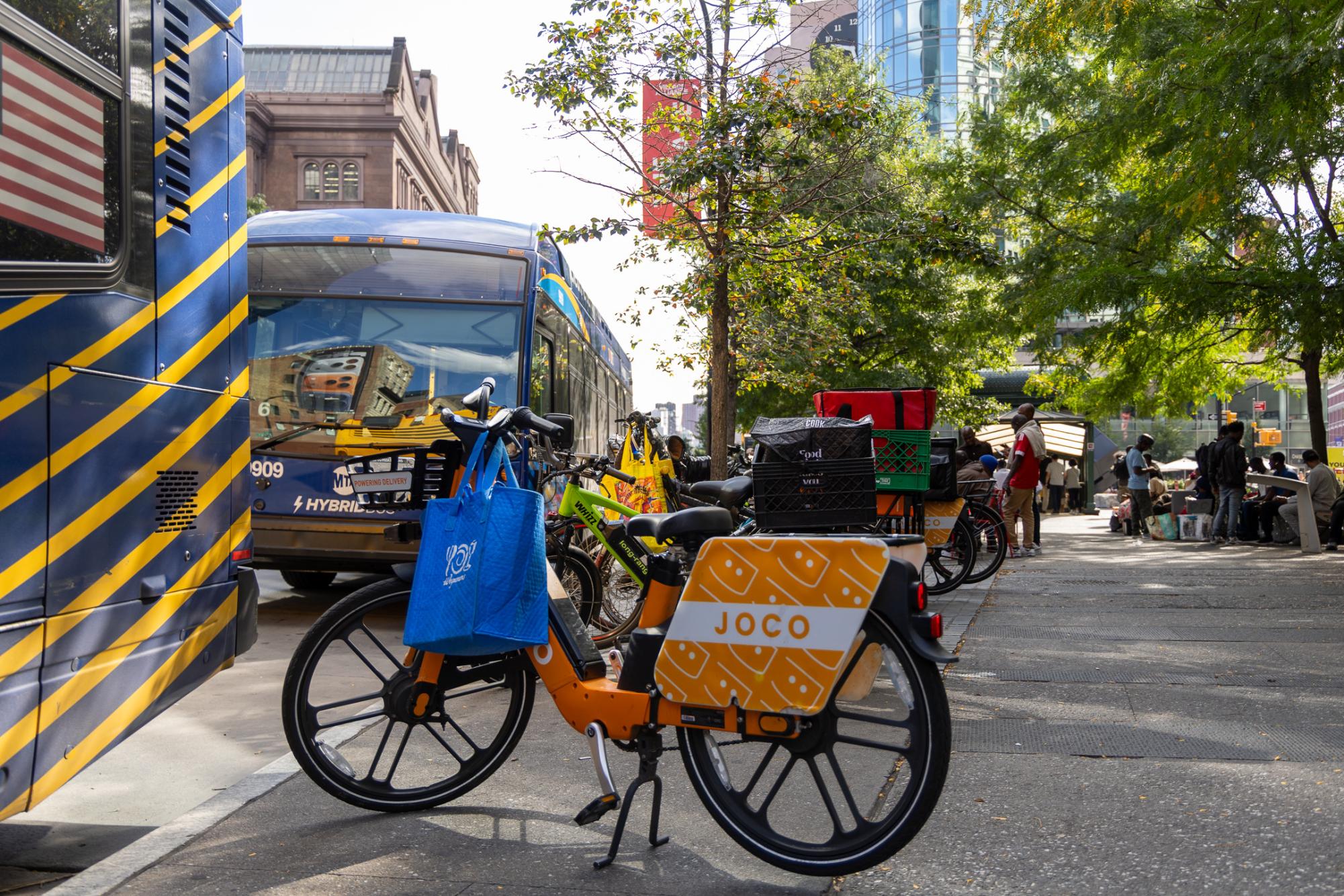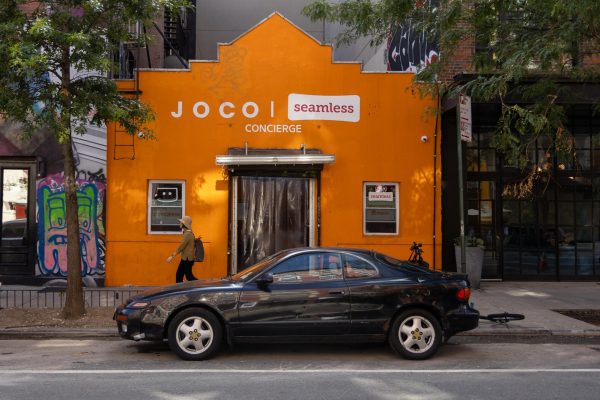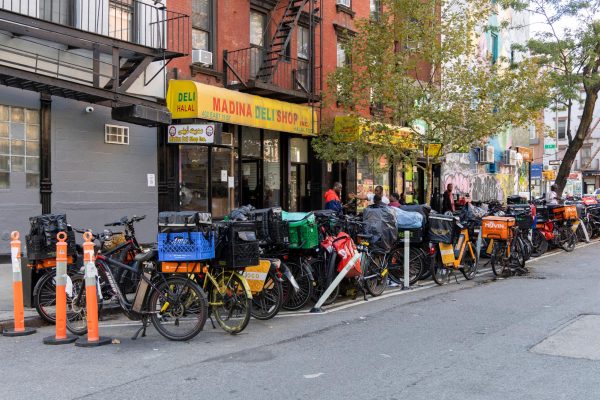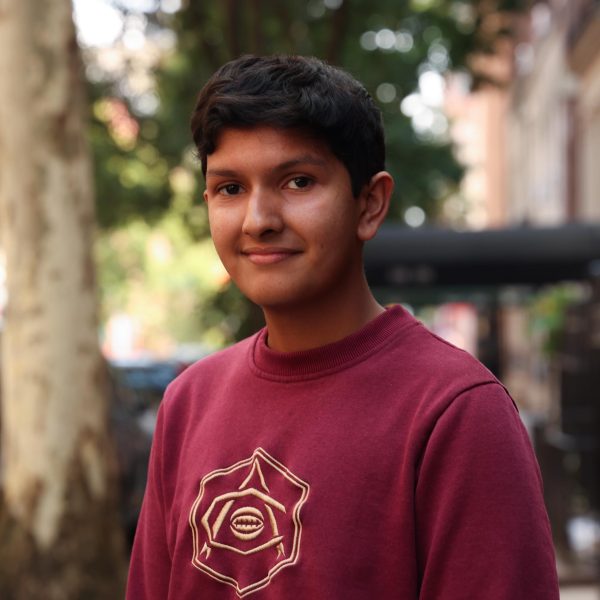The immigrant delivery workers behind every order
Under the Arch
The immigrant delivery workers behind every order
Tens of thousands of food delivery workers face mounting challenges in a city that relies on their labor.
Krish Dev, Digital Director | October 6, 2025

Interviews with delivery workers have been translated from French.
Three years ago, Yannick left Senegal for New York City to earn a university degree. But when faced with a tuition fee he could not afford, he was forced to seek immediate income. Joining thousands of other newly arrived immigrants on the streets, Yannick traded classes for the unforgiving, essential work of delivering food across the city.
Delivery workers like Yannick can be found around campus waiting outside restaurants in Union Square, maneuvering through traffic on Broadway and clustering at Astor Place between orders. Behind each delivery is a sprawling workforce of more than 60,000 delivery workers across the city, the majority of whom are immigrants.
“Most of us come from Senegal, Mali and Guinea — apart from that, there are just a few other nationalities,” said Yannick, who asked to be identified only by his first name due to his immigration status. “Delivery work allows us to help our parents and to help the family.”
Understanding this workforce has become a priority for researchers at C2SMARTER at the Tandon School of Engineering. Jingqin Gao, the transportation research center’s assistant director, oversees an ongoing study on delivery workers’ travel patterns and everyday challenges. Her team has conducted on-the-ground traffic counts across all five boroughs and surveyed over 300 workers at 43 unique locations.
One of the most persistent challenges relayed in the surveys was bike theft, according to C2SMARTER project manager Holly Chase. She said this fear pushes many workers toward renting bikes instead of purchasing their own.
“A lot of the people using those services like JOCO or Whizz are doing it because it’s somewhat safer to have a rental than to invest in a personal e-bike only to have it stolen,” Chase told WSN.
JOCO, which exclusively rents bikes to delivery workers for around $90 a week, has around 10,000 active monthly users according to Yaakov Lipsker, who works in business and product strategy at the New York-based company.

Yannick rents bikes from JOCO and frequents the company’s “concierge” on East 12th Street. The rest stop initially served as a utilitarian hub for battery swaps — now, on any given afternoon, the space buzzes with multiple languages as workers huddle over phones streaming soccer games and eat bowls of jollof rice between shifts.
“We throw community events there once or twice a week and it’s been awesome to see the impact we’re making,” Lipsker told WSN. “We also have a prayer area set up, because in the last few years, there’s been an influx of migrants coming into New York City, and a lot of them are religious and pray five times a day.”
Lipsker said that two years ago, about 80% of JOCO users navigated the app in English or Spanish. Now, around half use French or Arabic, mirroring the recent surge in West African migrants who have increasingly turned to delivery work as their entry point into the city’s economy.

Just one block away from the JOCO concierge and two blocks from Cafewal, a volunteer-run daily kitchen popular among West African delivery workers, another community has formed on 11th Street between First Avenue and Avenue A, where dozens of delivery workers gather in front of Madina Halal Meat & Grocery throughout the day.
The informal nature of the East Village hub has stirred tensions with some residents. The New York City Police Department confiscated over 50 bikes during sweeps in July and August after nearby residents submitted complaints citing “hazardous conditions,” Documented reported.
“Some of our neighbors are kind to us, but others try to do everything to remove us, to make sure that we leave this place,” said Ibrahim, a Guinean asylum seeker and delivery worker who also asked to be identified only by his first name due to his immigration status. “But we are here and we have no problems. When we come, we take our equipment, go to work all day and come back.”
In May, the NYPD tightened its policy toward bikers citywide, issuing criminal summonses instead of regular traffic tickets for low-level offenses such as running red lights or disregarding stop signs. The change threatens heavier penalties and long-term consequences for workers, particularly those navigating immigration proceedings.
But the policing shift is just one part of a rapidly changing policy landscape for delivery workers, which also includes new safety regulations, more bike lanes and heightened minimum wage.
“We need to understand the travel pattern change, especially in the transition of all these new rules,” Gao said.
For workers like Yannick, keeping up with City Hall isn’t the primary concern. What they need, he said, is practical support from the New York City Department of Transportation.
“The income is good, but the government can help with the working conditions,” Yannick said. “We want the government to help us, as they have the means to help the population, especially in regards to traffic.”
Yannick’s vision aligns with what Liberal Studies professor Cristina-Ioana Dragomir argues the city should provide. Research she’s co-sponsoring at Tandon suggests a four-pronged approach: providing real-time information and training on climate hazards, publicizing exposure data, investing in bike infrastructure and funding legal and translation services.
“Ultimately, the city must treat e-bike delivery workers — including immigrants — as essential,” Dragomir wrote in an email statement to WSN. “Their safety and dignity are integral to New York’s resilience in the face of intensifying environmental hazards.”
While Ibrahim also wants more city support, particularly safe spaces where he can store his bike without fear of confiscation or conflict, he also has a message for the people who depend on his labor.
“I want students to know the work isn’t easy,” Ibrahim said. “Sometimes it’s very cold outside, sometimes it rains and other times it’s windy — the work conditions are difficult. So if they place orders and we deliver to them, they should be kind and acknowledge that we did the job well.”
Contact Krish Dev at [email protected].

Krish Dev is a third-year senior studying computer science and linguistics. This is his third semester on WSN’s management team, following his time as...

























































































































































